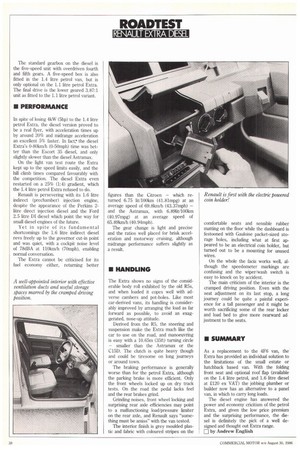ROADTEST
Page 40

If you've noticed an error in this article please click here to report it so we can fix it.
RENAULT EXTRA DIESEL
The standard gearbox on the diesel is the five-speed unit with overdriven fourth and fifth gears. A five-speed box is also fitted in the 1.4 litre petrol van, but is only optional on the 1.1 litre petrol Extra. The final drive is the lower geared 3.87:1 unit as fitted to the 1.1 litre petrol variant.
• PERFORMANCE
In spite of losing 4kW (5hp) to the 1.4 litre petrol Extra, the diesel version proved to be a real flyer, with acceleration times up by around 20% and midrange acceleration an excellent 5% faster. In fact' the diesel Extra's 0-80un/II (0-50mph) time was better than the Escort 35 diesel, and only slightly slower than the diesel Astramax.
On the light van test route the Extra kept up to the speed limits easily, and the hill climb times compared favourably with the competition. The diesel Extra even restarted on a 25% (1:4) gradient, which the 1.4 litre petrol Extra refused to do.
Renault is persevering with its 1.6 litre indirect (precharnber) injection engine, despite the appearance of the Perkins 2litre direct injection diesel and the Ford 2.5 litre DI diesel which point the way for small diesel engines of the future.
Yet in spite of its fundamental shortcomings the 1.6 litre indirect diesel revs freely up to the governor cut-in point and was quiet, with a cockpit noise level of 78dBA at 110knai (70mph), enabling normal conversation.
The Extra cannot be criticised for its fuel economy either, returning better figures than the Citroen — which returned 6.75 lit/100km (41.81mpg) at an average speed of 69.81an/h (43.37mph) — and the Astramax, with 6.891it/100km (40.97mpg) at an average speed of 65. 89Iun/h (40.94mph).
The gear change is light and precise and the ratios well placed for brisk acceleration and motorway cruising, although midrange performance suffers slightly as a result.
• HANDLING
The Extra shows no signs of the considerable body roll exhibited by the old R5s, and when loaded it copes well with adverse cambers and pot-holes. Like most car-derived vans, its handling is considerably improved by arranging the load as far forward as possible, to avoid an exaggerated, nose-up attitude.
Derived from the R5, the steering and suspension make the Extra much like the car to use on the road, and manoeuvring is easy with a 10.65m (35ft) turning circle — smaller than the Astramax or the C1511 The clutch is quite heavy though and could be tiresome on long journeys or around town.
The braking performance is generally worse than for the petrol Extra, although the parking brake is more efficient. Only the front wheels locked up on dry track tests. On the road the pedal lacks feel and the rear brakes grind.
Grinding noises, front wheel locking and surprising rear axle efficiencies may point to a malfunctioning load/pressure limiter on the rear axle, and Renault says "something must be amiss" with the van tested.
The interior finish is grey moulded plastic and fabric with coloured stripes on the
comfortable seats and sensible rubber matting on the floor while the dashboard is festooned with Gauloise packet-sized storage holes, including what at first appeared to be an electrical coin holder, but turned out to be a mounting for unused wires.
On the whole the facia works well, although the speedometer markings are confusing and the wiper/wash switch is easy to knock on by accident.
The main criticism of the interior is the cramped driving position. Even with the seat adjustment on its last stop, a long journey could be quite a painful experience for a tall passenger and it might be worth sacrificing some of the rear locker and load bed to give more rearward adjustment to the seats.
• SUMMARY
As a replacement to the 4F6 van, the' Extra has provided an individual solution to the limitations of the small estate or hatchback based van. With the folding front seat and optional roof flap (available on the 1.4 litre petrol, and 1.6 litre diesel at 2120 ex VAT) the jobbing plumber or builder now has an alternative to a panel van, in which to carry long loads.
The diesel engine has answered the power and economy cricitism of the petrol Extra, and given the low price premium and the surprising performance, the diesel is definitely the pick of a well designed and thought out Extra range.
E by Andrew English












































































